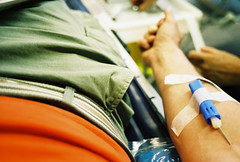Many years ago, there used to be a minister in West Bengal Chief Minister Jyoti Basu’s cabinet by the name of Benoy Choudhury. He used to be the deputy chief minister at one point and was responsible for all the land reforms carried out in the early years of the Left Front government. An austere, honest and humble man in life, he stayed that way in death. When he died, there was neither cremation nor burial - he had donated his remains to the government medical college so that students might learn some anatomy by dissecting up his body.
Recently, A.K.Antony set another sort of precedent when he donated his organs as did celebrities Priyanka Chopra and cricketer Navjot Singh Sidhu. Preity Zinta has done this even earlier. This is great. For just as it is desirable to avoid ostentatious ness in the happier moments of life, so too in moments of grief – especially when there is a lot that could be done with our bodies even after we have passed on. As Priyanka Chopra put it quite well, in a symbolic sense, donating your organs enables you to live for ever.
But while such romantic notions of eternity are fine; there is a case to revisit the entire gamut of organ donation in the country. For on one side, there is a scarcity of vital organs so much so that there is a thriving black market in them and on the other side, every such organs are being consigned to the flames or buried six feet under.
As Scott Carney writes in Wired magazine,
“Scarcity has long been a key driver of the global kidney market, but in regions like India, Brazil, Pakistan and China, sellers are dealing with signs of a surplus. Operations that once set back patients tens of thousands of dollars on the black market can now be had for a fraction of the cost in some places.” and body brokers are now connecting wealthy patients with healthy but poor people willing to sell their organs for cash. The international market for human parts is thriving: A kidney goes for $25,000 in Russia, a heart for $290,000 in South Africa
In organ donation, the main taboos seem to be religious and here it does not seem to make much of a difference as to which religion one belongs to. But the taboos are clearly relative. The large numbers of donors who are poor and living on the edge who are selling of their organs for a pittance clearly are prepared to sell to survive another day. The presence of affluent doctors like Amit Kumar acting as racketeers and brokers proves that religious taboos are not too binding at the rich end of society either.

Not too long ago, blood donation was handicapped by similar taboos and myths. Now while it may be a little premature to claim that all the taboos have gone away, it goes without saying that we have come a long way indeed. Though fringes of commercialism still persist in the form of the “professional blood donors”, the voluntary blood donor movement – aided by strong social backing and helpful legislation has grown. Perhaps, we need to go the same route for harvesting our organs and who knows the large catchments of voluntary blood donors who already know what it means to gift life through donating blood may become the bulwark of another movement – those who donate blood in life…. And their body parts in death…


No comments:
Post a Comment